Unit 5 Why do you like pandas? 核心考点讲练(共26张PPT)-2022-2023学年七年级英语下册同步精品课堂(人教版)
文档属性
| 名称 | Unit 5 Why do you like pandas? 核心考点讲练(共26张PPT)-2022-2023学年七年级英语下册同步精品课堂(人教版) | 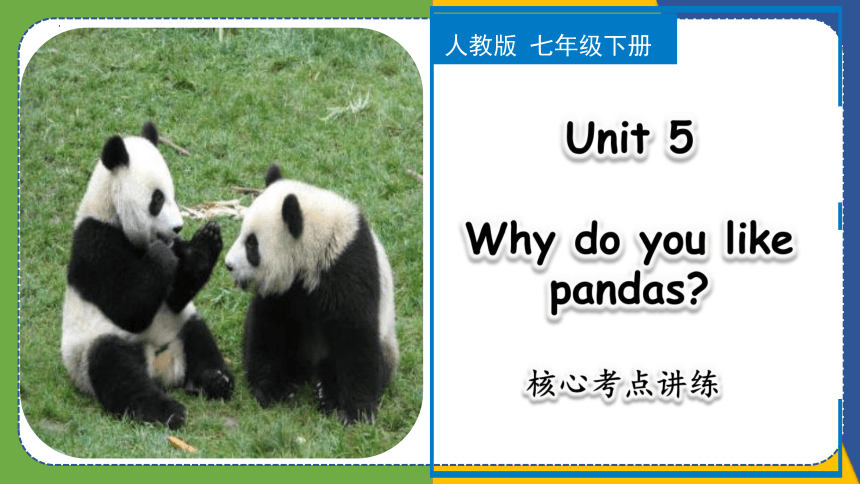 | |
| 格式 | pptx | ||
| 文件大小 | 963.3KB | ||
| 资源类型 | 教案 | ||
| 版本资源 | 人教新目标(Go for it)版 | ||
| 科目 | 英语 | ||
| 更新时间 | 2023-03-07 09:11:53 | ||
图片预览

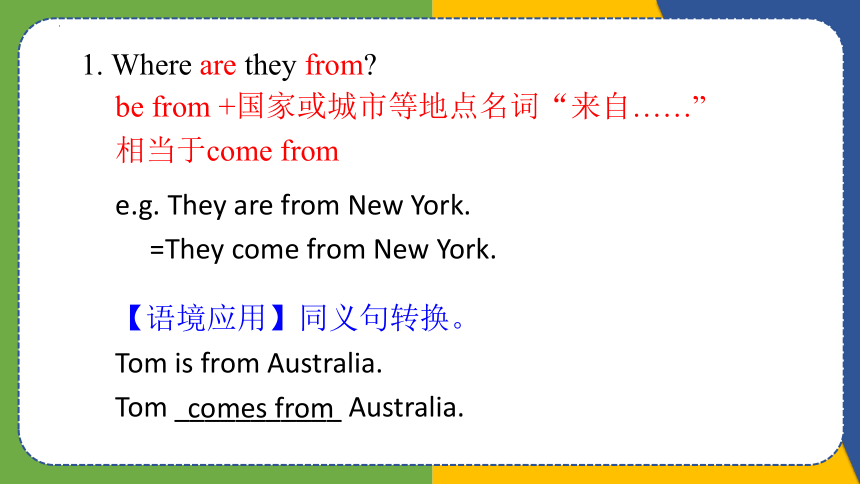
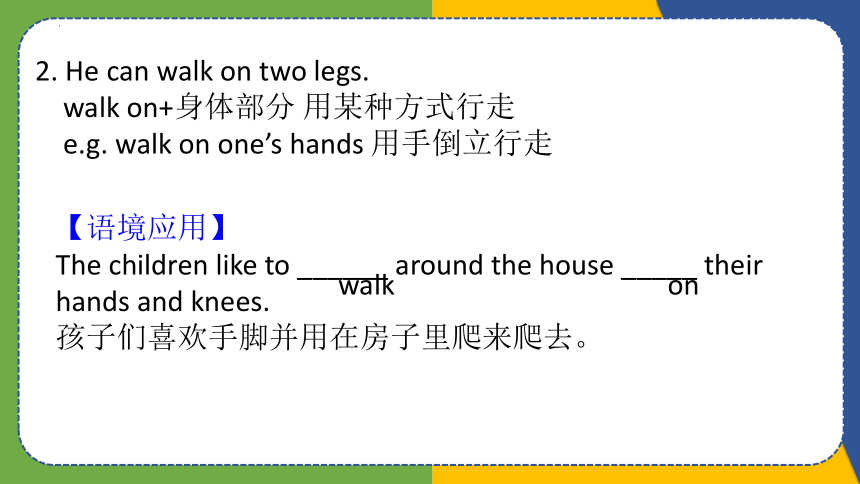
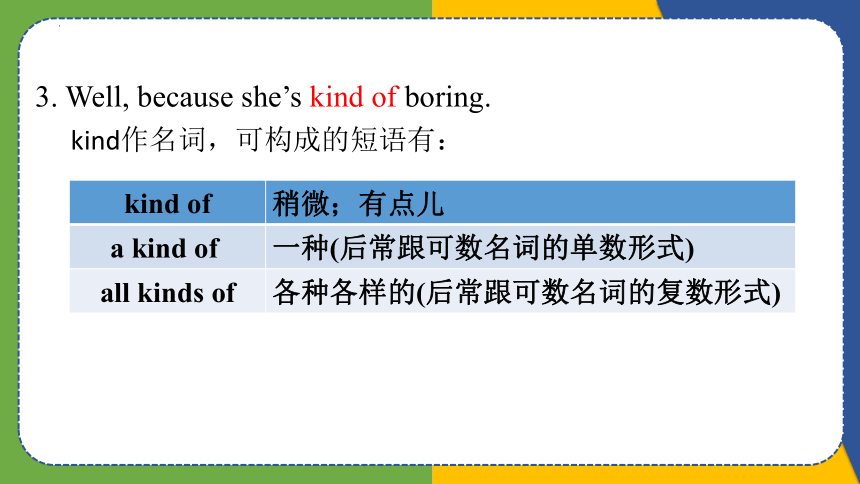
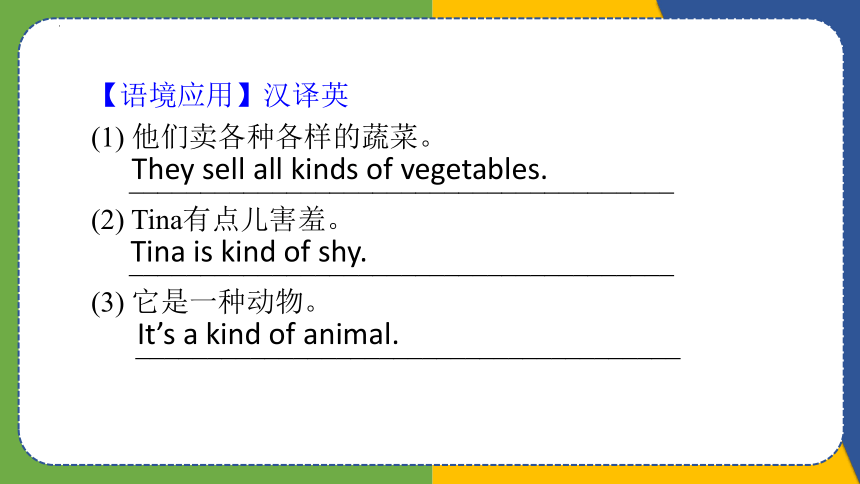
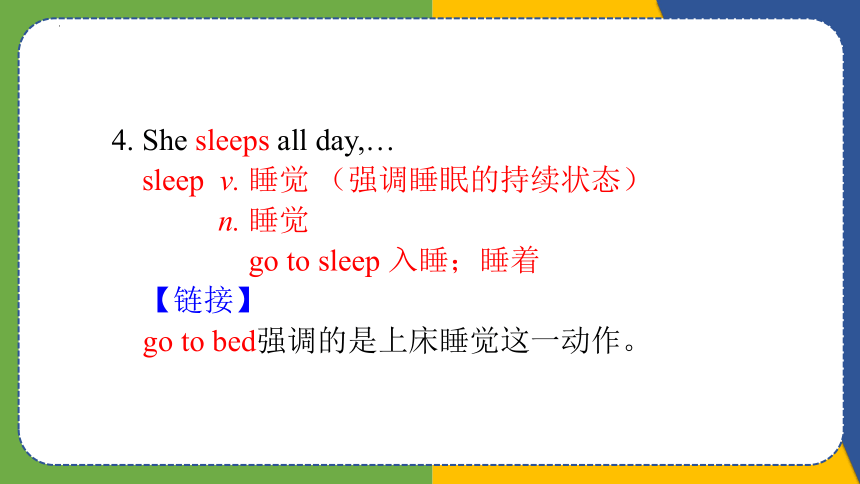
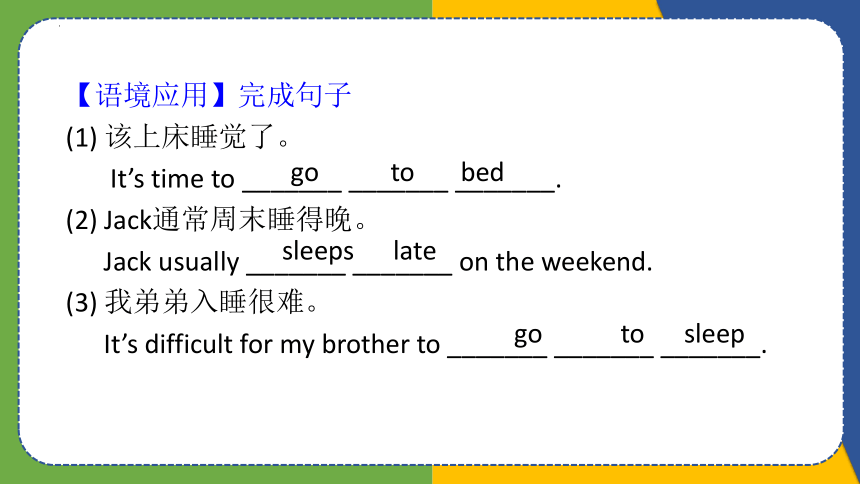
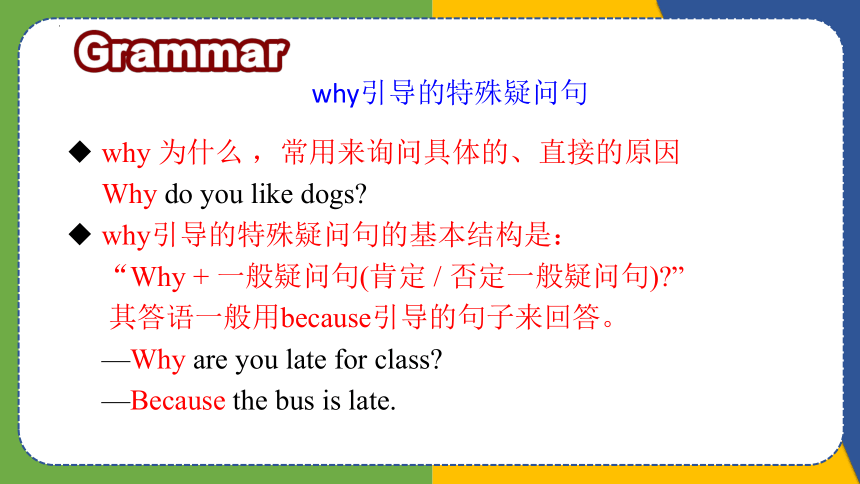
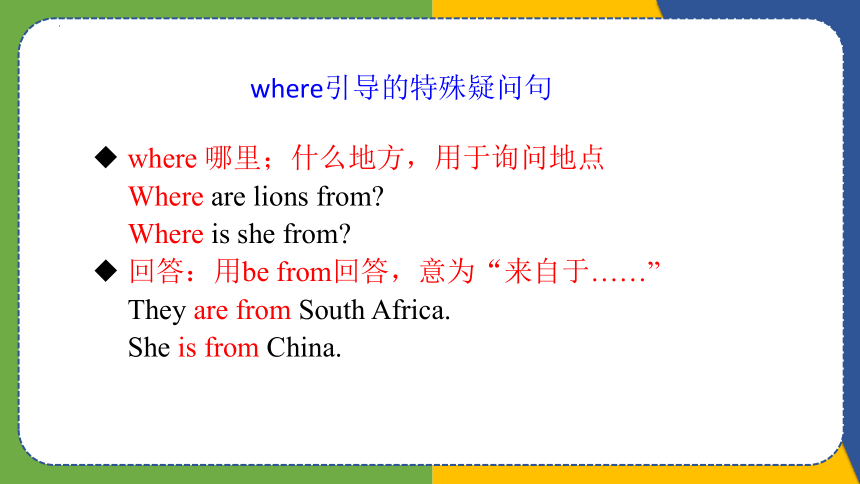
文档简介
(共26张PPT)
人教版 七年级下册
Unit 5
Why do you like pandas
核心考点讲练
1. Where are they from
be from +国家或城市等地点名词“来自……”
相当于come from
e.g. They are from New York.
=They come from New York.
【语境应用】同义句转换。
Tom is from Australia.
Tom ___________ Australia.
comes from
2. He can walk on two legs.
walk on+身体部分 用某种方式行走
e.g. walk on one’s hands 用手倒立行走
【语境应用】
The children like to ______ around the house _____ their hands and knees.
孩子们喜欢手脚并用在房子里爬来爬去。
walk
on
3. Well, because she’s kind of boring.
kind of 稍微;有点儿
a kind of 一种(后常跟可数名词的单数形式)
all kinds of 各种各样的(后常跟可数名词的复数形式)
kind作名词,可构成的短语有:
【语境应用】汉译英
(1) 他们卖各种各样的蔬菜。
______________________________________
(2) Tina有点儿害羞。
______________________________________
(3) 它是一种动物。
______________________________________
They sell all kinds of vegetables.
Tina is kind of shy.
It’s a kind of animal.
4. She sleeps all day,…
sleep v. 睡觉 (强调睡眠的持续状态)
n. 睡觉
go to sleep 入睡;睡着
【链接】
go to bed强调的是上床睡觉这一动作。
【语境应用】完成句子
(1) 该上床睡觉了。
It’s time to _______ _______ _______.
(2) Jack通常周末睡得晚。
Jack usually _______ _______ on the weekend.
(3) 我弟弟入睡很难。
It’s difficult for my brother to _______ _______ _______.
go to bed
sleeps late
go to sleep
◆ why 为什么 ,常用来询问具体的、直接的原因
Why do you like dogs
◆ why引导的特殊疑问句的基本结构是:
“Why + 一般疑问句(肯定 / 否定一般疑问句) ”
其答语一般用because引导的句子来回答。
—Why are you late for class
—Because the bus is late.
why引导的特殊疑问句
◆ where 哪里;什么地方,用于询问地点
Where are lions from
Where is she from
◆ 回答:用be from回答,意为“来自于……”
They are from South Africa.
She is from China.
where引导的特殊疑问句
… they’re friendly and smart.
friendly adj. 友好的
be friendly to sb. 对某人友好
【语境应用】完成句子
Alice对她的同学很友好。
Alice _______ _______ _______ her classmates.
is friendly to
1. Our first flag had a white elephant on it.
我们的第一面国旗上就(绘)有一头白象。
had 曾经有;过去有 have的过去式形式
意味着“现在”泰国国旗上已不再有白象了。
2. People say that “an elephant never forgets”.
人们说“大象从来不会忘记”。
forget v. (forgot) 忘记;遗忘
forget sb. / sth. 忘记某人/某事
forget doing sth. 忘记做过某事
forget to do sth. 忘记要做某事
e.g. Someone forgets to turn off the lights.
有人忘记关灯了。
I forget telling him the news.
我忘记告诉过他这消息了。
【语境应用】完成句子
(1) 别忘了给我打电话。
Don’t _______ _______ _______ me.
(2) 我永远也不会忘记第一次见她的情景。
I will never _______ _______ her for the first time.
(3) 对不起,我总是忘记你的名字。
I’m sorry. I always _______ _______ _______.
forget to call
forget meeting
forget your name
大象拥有人类难及的非凡记忆力,因此英语有have a memory like an elephant这样的习语,用来描述一个人的记忆力好。英语中常见的用动物特征来进行比喻的习语有:
drink like a fish (特别能够喝酒;见酒不要命)
eat like a horse (特别能吃;胃口大)
fight like cats and dogs (争吵不休)
be like a cat on hot bricks (如坐针毡;浑身不自在)
be like a bull in a china shop (非常鲁莽;笨手笨脚)
3. Elephants can walk for a long time and never get lost.
大象能够长时间行走而且从不迷路。
1) lost adj. 走失的; 迷路的;
失散的, 丢失的; 遗失的
get / be lost 丢失; 走失; 迷路
e.g. What bad luck! My keys are lost again.
真是倒霉!我的钥匙又丢了。
The little girl couldn’t find her home. She got lost.
小女孩找不到家了,她迷路了。
2) lost还经常直接用于名词之前,做定语修饰名词。
e.g. a lost child 走丢了的孩子
the lost tourists 迷路的游客们
a lost watch 被人遗失的手表
4. But elephants are in great danger.
但是大象面临巨大的危险。
danger n. 危险
danger
dangerous adj. 危险的,有危害的
be in (big/great) danger 处于(极大的) 危险之中
(be) out of danger 脱离危险
1. The boy falls into the lake. ___________________
小男孩落入湖中,他处于极大危险中。
He’s in great danger.
2. The doctor says ______________________
大夫说现在他脱离了危险。
he’s out of danger now.
【语境应用】完成句子
5. People cut down many trees so elephants are losing their homes.
由于人类大量砍伐树木, 大象正在失去它们的家园。
so和because都是连词,可用来连接两个表示因果关系的句子,但so引导的分句表示结果,而because引导的分句表示原因。
【注意】because和so不可出现在同一个句子中,但它们引导的句子可互相转换。
e.g. My mother is ill, so I can’t go to the park with you.
= I can’t go to the park with you, because my mother is ill.
6. Today there are only about 3,000 elephants (over 100,000 before).
如今, 仅剩下3000头大象(之前超过10万)。
over prep.
①超过,多于 (相当于more than)
toys suitable for children over the age of three
适合 3 岁以上儿童的玩具
②在……上方 (表示垂直上方)
A lamp hung over the table.一盏灯悬挂在桌子上方。
on, over
(1) I can see a bridge _______ the river.
(2) —Where is my math book, Mom
—It’s _______ the sofa.
(3) There are _______ forty students in the club.
over
【语境应用】选词填空
on
over
【链接】
on也有“在……之上”的意思,一般指一件东西在另一件东西之上,物体之间有接触。
3000可使用thousand一词,读作three thousand。
英语中没有单独的词汇表达“万”的概念,必须通过“thousand”转换表达。
如:100,000只能使用thousand, 读作:
one hundred thousand
7. We must save the trees and not buy things made of ivory.
我们必须拯救树木并且不买象牙做的东西。
save vt. 救;救助
含有save的短语
save one’s life 挽救某人的生命
save money 攒钱
save time 节省时间
save water 节约用水
He saved the child from drowning. 他救起了那个溺水儿童。
【拓展】
be made from +原材料
由……制成(从制成品中看不出原材料)
e.g. 纸是由木头制成的。(翻译)
Paper is made from wood.
(be) made of +原材料
由……制成 (从制成品中仍能看出原材料)
e.g. The table is made of wood.
这张桌子是由木头制成的。
【语境应用】完成句子
(1) 谢谢你救了我女儿的命。
Thank you for _______ _______ _________ _______.
(2) 我们必须节约用水。
We must _______ _______.
(3) 我爷爷攒了很多钱。
My grandpa _______ _______ _______ _______.
saving my daughter's life
save water
saves lots of money
8. Isn’t she beautiful
难道她不漂亮吗?
否定疑问句,用来表示反问、责备或说话人的看法和惊异的情绪等。
句式结构:be/助动词/情态动词的否定式+主语+其它?
e.g. 难道他不会洗餐具吗?
Can’t he do the dishes
人教版 七年级下册
Unit 5
Why do you like pandas
核心考点讲练
1. Where are they from
be from +国家或城市等地点名词“来自……”
相当于come from
e.g. They are from New York.
=They come from New York.
【语境应用】同义句转换。
Tom is from Australia.
Tom ___________ Australia.
comes from
2. He can walk on two legs.
walk on+身体部分 用某种方式行走
e.g. walk on one’s hands 用手倒立行走
【语境应用】
The children like to ______ around the house _____ their hands and knees.
孩子们喜欢手脚并用在房子里爬来爬去。
walk
on
3. Well, because she’s kind of boring.
kind of 稍微;有点儿
a kind of 一种(后常跟可数名词的单数形式)
all kinds of 各种各样的(后常跟可数名词的复数形式)
kind作名词,可构成的短语有:
【语境应用】汉译英
(1) 他们卖各种各样的蔬菜。
______________________________________
(2) Tina有点儿害羞。
______________________________________
(3) 它是一种动物。
______________________________________
They sell all kinds of vegetables.
Tina is kind of shy.
It’s a kind of animal.
4. She sleeps all day,…
sleep v. 睡觉 (强调睡眠的持续状态)
n. 睡觉
go to sleep 入睡;睡着
【链接】
go to bed强调的是上床睡觉这一动作。
【语境应用】完成句子
(1) 该上床睡觉了。
It’s time to _______ _______ _______.
(2) Jack通常周末睡得晚。
Jack usually _______ _______ on the weekend.
(3) 我弟弟入睡很难。
It’s difficult for my brother to _______ _______ _______.
go to bed
sleeps late
go to sleep
◆ why 为什么 ,常用来询问具体的、直接的原因
Why do you like dogs
◆ why引导的特殊疑问句的基本结构是:
“Why + 一般疑问句(肯定 / 否定一般疑问句) ”
其答语一般用because引导的句子来回答。
—Why are you late for class
—Because the bus is late.
why引导的特殊疑问句
◆ where 哪里;什么地方,用于询问地点
Where are lions from
Where is she from
◆ 回答:用be from回答,意为“来自于……”
They are from South Africa.
She is from China.
where引导的特殊疑问句
… they’re friendly and smart.
friendly adj. 友好的
be friendly to sb. 对某人友好
【语境应用】完成句子
Alice对她的同学很友好。
Alice _______ _______ _______ her classmates.
is friendly to
1. Our first flag had a white elephant on it.
我们的第一面国旗上就(绘)有一头白象。
had 曾经有;过去有 have的过去式形式
意味着“现在”泰国国旗上已不再有白象了。
2. People say that “an elephant never forgets”.
人们说“大象从来不会忘记”。
forget v. (forgot) 忘记;遗忘
forget sb. / sth. 忘记某人/某事
forget doing sth. 忘记做过某事
forget to do sth. 忘记要做某事
e.g. Someone forgets to turn off the lights.
有人忘记关灯了。
I forget telling him the news.
我忘记告诉过他这消息了。
【语境应用】完成句子
(1) 别忘了给我打电话。
Don’t _______ _______ _______ me.
(2) 我永远也不会忘记第一次见她的情景。
I will never _______ _______ her for the first time.
(3) 对不起,我总是忘记你的名字。
I’m sorry. I always _______ _______ _______.
forget to call
forget meeting
forget your name
大象拥有人类难及的非凡记忆力,因此英语有have a memory like an elephant这样的习语,用来描述一个人的记忆力好。英语中常见的用动物特征来进行比喻的习语有:
drink like a fish (特别能够喝酒;见酒不要命)
eat like a horse (特别能吃;胃口大)
fight like cats and dogs (争吵不休)
be like a cat on hot bricks (如坐针毡;浑身不自在)
be like a bull in a china shop (非常鲁莽;笨手笨脚)
3. Elephants can walk for a long time and never get lost.
大象能够长时间行走而且从不迷路。
1) lost adj. 走失的; 迷路的;
失散的, 丢失的; 遗失的
get / be lost 丢失; 走失; 迷路
e.g. What bad luck! My keys are lost again.
真是倒霉!我的钥匙又丢了。
The little girl couldn’t find her home. She got lost.
小女孩找不到家了,她迷路了。
2) lost还经常直接用于名词之前,做定语修饰名词。
e.g. a lost child 走丢了的孩子
the lost tourists 迷路的游客们
a lost watch 被人遗失的手表
4. But elephants are in great danger.
但是大象面临巨大的危险。
danger n. 危险
danger
dangerous adj. 危险的,有危害的
be in (big/great) danger 处于(极大的) 危险之中
(be) out of danger 脱离危险
1. The boy falls into the lake. ___________________
小男孩落入湖中,他处于极大危险中。
He’s in great danger.
2. The doctor says ______________________
大夫说现在他脱离了危险。
he’s out of danger now.
【语境应用】完成句子
5. People cut down many trees so elephants are losing their homes.
由于人类大量砍伐树木, 大象正在失去它们的家园。
so和because都是连词,可用来连接两个表示因果关系的句子,但so引导的分句表示结果,而because引导的分句表示原因。
【注意】because和so不可出现在同一个句子中,但它们引导的句子可互相转换。
e.g. My mother is ill, so I can’t go to the park with you.
= I can’t go to the park with you, because my mother is ill.
6. Today there are only about 3,000 elephants (over 100,000 before).
如今, 仅剩下3000头大象(之前超过10万)。
over prep.
①超过,多于 (相当于more than)
toys suitable for children over the age of three
适合 3 岁以上儿童的玩具
②在……上方 (表示垂直上方)
A lamp hung over the table.一盏灯悬挂在桌子上方。
on, over
(1) I can see a bridge _______ the river.
(2) —Where is my math book, Mom
—It’s _______ the sofa.
(3) There are _______ forty students in the club.
over
【语境应用】选词填空
on
over
【链接】
on也有“在……之上”的意思,一般指一件东西在另一件东西之上,物体之间有接触。
3000可使用thousand一词,读作three thousand。
英语中没有单独的词汇表达“万”的概念,必须通过“thousand”转换表达。
如:100,000只能使用thousand, 读作:
one hundred thousand
7. We must save the trees and not buy things made of ivory.
我们必须拯救树木并且不买象牙做的东西。
save vt. 救;救助
含有save的短语
save one’s life 挽救某人的生命
save money 攒钱
save time 节省时间
save water 节约用水
He saved the child from drowning. 他救起了那个溺水儿童。
【拓展】
be made from +原材料
由……制成(从制成品中看不出原材料)
e.g. 纸是由木头制成的。(翻译)
Paper is made from wood.
(be) made of +原材料
由……制成 (从制成品中仍能看出原材料)
e.g. The table is made of wood.
这张桌子是由木头制成的。
【语境应用】完成句子
(1) 谢谢你救了我女儿的命。
Thank you for _______ _______ _________ _______.
(2) 我们必须节约用水。
We must _______ _______.
(3) 我爷爷攒了很多钱。
My grandpa _______ _______ _______ _______.
saving my daughter's life
save water
saves lots of money
8. Isn’t she beautiful
难道她不漂亮吗?
否定疑问句,用来表示反问、责备或说话人的看法和惊异的情绪等。
句式结构:be/助动词/情态动词的否定式+主语+其它?
e.g. 难道他不会洗餐具吗?
Can’t he do the dishes
同课章节目录
- Unit 1 Can you play the guitar?
- Section A
- Section B
- Unit 2 What time do you go to school?
- Section A
- Section B
- Unit 3 How do you get to school?
- Section A
- Section B
- Unit 4 Don't eat in class.
- Section A
- Section B
- Unit 5 Why do you like pandas?
- Section A
- Section B
- Unit 6 I'm watching TV.
- Section A
- Section B
- Review of Units 1-6
- Unit 7 It's raining!
- Section A
- Section B
- Unit 8 Is there a post office near here?
- Section A
- Section B
- Unit 9 What does he look like?
- Section A
- Section B
- Unit 10 I'd like some noodles.
- Section A
- Section B
- Unit 11 How was your school trip?
- Section A
- Section B
- Unit 12 What did you do last weekend?
- Section A
- Section B
